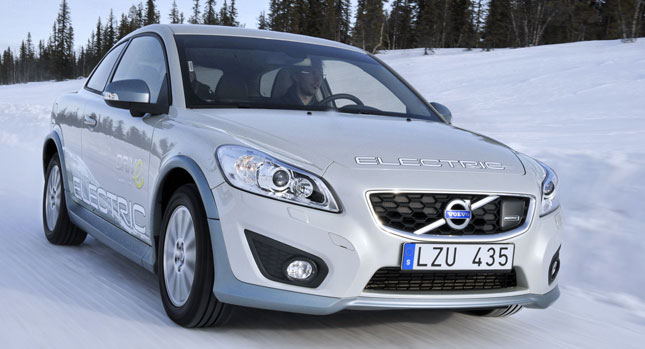One of the major fears consumers have regarding electric vehicles, besides range anxiety, is how these cars are going to function in rough weather conditions. We all know batteries are sensitive to extreme temperatures, which can affect their capacity of storing electricity.
This is why Volvo is trying out its C30 Electric model in the north of Sweden, inside the Arctic Circle. Temperatures as low as -20 degrees Celsius are something normal in this part of the world, so Volvo engineers want to ensure the battery-powered car runs smoothly even in harsh environments.
Volvo has developed several new test methods for its electric vehicles, with the C30 Electric having to undergo over 200 different tests. “We must ensure that the C30 Electric performs as intended when driving, parking and charging in a variety of conditions, from normal to very cold or hot. Northern Sweden is the perfect place to do sub-zero temperature testing,” says Lennart Stegland, director of Volvo Cars’ Special Vehicles.
To cope with freezing temperatures, the C30 Electric is equipped with three different climate systems: one for the passenger cabin, one for the battery pack and one for the electric motor and power electronics (with the latter being water-cooled). Since there is no conventional combustion engine aboard, the C30 Electric is fitted with a bio-ethanol powered heater that takes care of passenger cabin heating. The car comes equipped with a tank that can carry 14.5 liters of bio-ethanol.
This solution is used in order to save energy from the batteries for driving range. However, on short distances it is also possible to heat or cool the cabin with electricity from the battery-pack.
Under normal driving conditions, maximum range is estimated at 150 km (93 miles) on a single battery charge. However, at temperatures of -10 degrees Celsius, Volvo says the C30 Electric will cover up to 90 km (56 miles) or 80 km (49.7 miles) at -33 degrees Celsius. The car is powered by an 82kW electric motor (110HP) linked to a lithium-ion battery, which takes up to eight hours to charge completely.
The car can reach a top speed of 130 km/h (80.7 mph) and accelerates from 0 to 100 km/h in 10.5 seconds. Scroll down to watch the Volvo C30 Electric during cold weather testing.
By Dan Mihalascu
PHOTO GALLERY



 _______________________________________________________________________VIDEO
_______________________________________________________________________VIDEO







